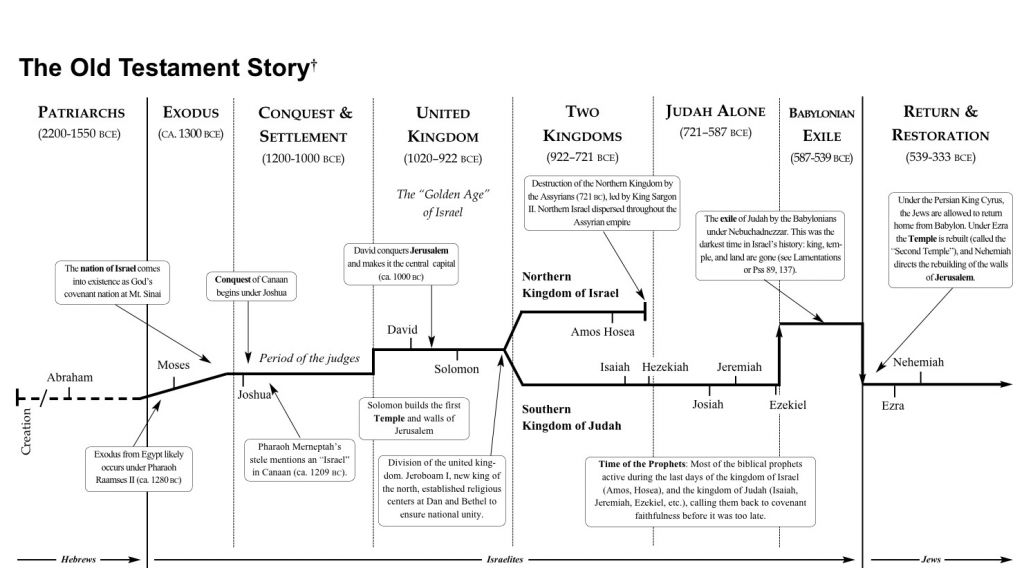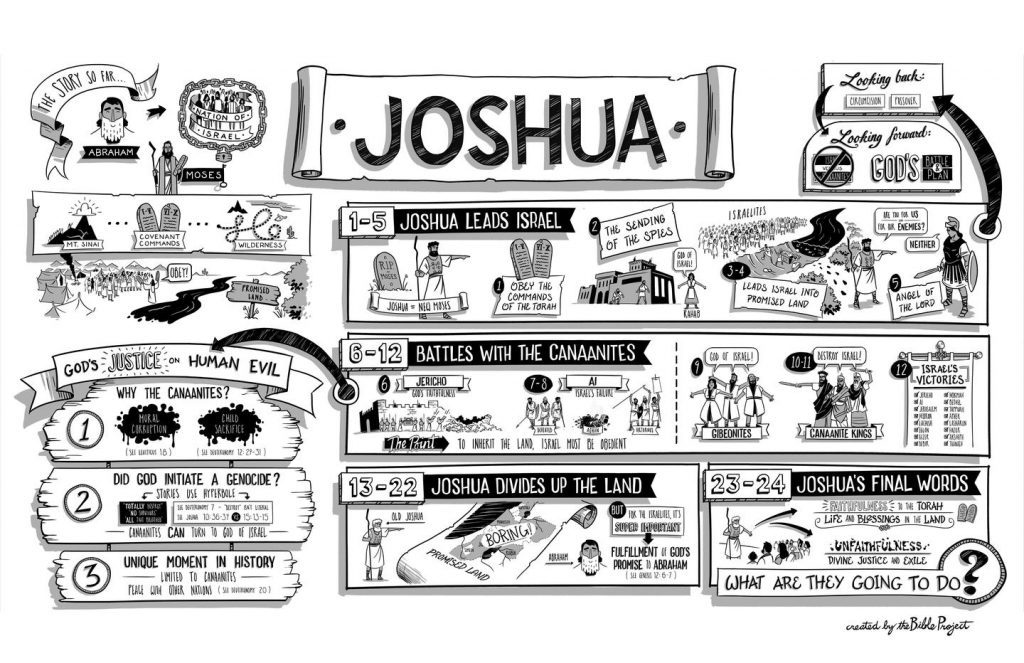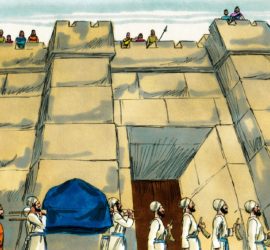Our sermon series is titled “Moving Forward – faith for the journey” from the Old Testament Book of Joshua.
Scroll down to see the sermon series and links to videos, audio files and text files.
Where does this book of the Old Testament fit?
Joshua begins and ends with the end of something else; it begins with the death of Moses. His death commences the transition of leadership of the ancient people of Israel to a man named Joshua with a big challenge and privilege ahead of him. But the focus is not on the prowess or heroism of the man, but on the faithfulness and convenant love of God, who remains true to past promises and is ever-present on the journey. Such faithfulness from God began to be seen in the Bible back in the first five books (known to Jewish people as Torah) and often attributed to Moses. A key moment in those beginnings is God’s promise to Abraham in Genesis chapter 12. This promise/covenant is fulfilled in part in Joshua’s life story. What Joshua is commissioned to do – lead God’s people through the Promised land – is something God ordained and will faithfully help the people to carry through.
God assures Joshua, “Arise and go” and “Just as I was with Moses, I will be with you.” We hear strains of Jesus’ words to his disciples before he departed to sit at God’s right hand on high according to Matthew 28:20, “I will be with you always, to the end of the age.”

What’s the story?

Check out the excellent summary of Joshua at The Bible Project here.
Navigating the politics of ancient times
The politics of land ownership, invasion, war, conquering others, all raise difficult questions for the modern reader. One of the keys to studying the faithfulness of God in this book (it’s main purpose) is to appreciate the context and historical circumstances. The nations that inhabited the lands God promised to Israel were known to be evil in so many ways and had claimed their territories without regard for God, for justice, or for custodianship. More than this, as historical finds verify in many ways, the nations inhabiting these lands known as Canaan were violent and ungodly in extreme ways. While it appears to the reader that Israel is seen as special, even elevated in importance before God, it is not of their own merit that this is so. In the books prior to Joshua, all nations have had opportunity to do what is right in God’s eyes, but have not done so. God’s plan is to establish a people of peace in the places that would stand as an attractive welcome to all future peoples to recognise and welcome God’s love, grace and leadership in their lives.
The conquests and division of the Promised Land should lead to reminding Christians today that the great benefits won for us on the cross by Christ are to be apprehended and shared generously. They are not rewards of our own making or by our own work, but are gifts of God to be enjoyed in community, provided by God, in Christ.
Benefit of this book for Christians
Like Joshua himself, many Christians lack confidence in God and faith for the daily journey of life. The Lord tells Joshua, “be strong and courageous, for you shall cause this people to inherit the land that I swore to their ancestors to give them.” Note that Joshua was called to do what God had already established would be able to take place. This is true for every follower of Christ who feels challenged with the responsibility of following Jesus, doing justice, bringing peace, and holding on in faith in this world today. The Lord tells Joshua, “Just as I was with Moses, so I will be with you. I will not leave or forsake you.” Jesus’ gift of the Spirit to all people of faith today connects back with the God who so graciously promised His presence to be with Joshua. When we feel like God may have or could abandon us, we will be reminded of God’s faithfulness in this book.
Joshua’s people were made to look back and remember all God’s acts of grace and salvation. They were also made to look back at the people’s failures, like that of Achan, and to be mindful of not rebelling against God’s ways. Memorial stones were a part of this remembering. We will consider in reading Joshua’s life journey what “stones” we should set up and be reminded by for our journey.
Peace and prosperity are elusive in our world today, as then. But the end of the journey in this book of the Bible leads to cities of refuge that show God’s grace mercy in the face of our failings in life. Then, finally, the people are led to commit their way to God’s faithful covenant love and to enjoy their gracious inheritance and be at “home” with God.
The Setting of Joshua
Joshua means “Yahweh saves,” an appropriate name for the man who led Israel, under God’s command, to victorious conquest of the Promised Land. Scholars believe that Joshua himself or a scribe under his direction penned most of the book. Early chapters include first hand experiences (the NIV uses the pronouns “we” and “us” in Joshua 5:1, 6, for example) and military details worthy of being known and recorded by a general. Joshua 24:26 refers to Joshua writing a portion of the book himself. After Joshua’s death, the high priests Eleazar or Phinehas may have supplemented some material in this book that alludes to events after the conquest (15:13–19; 19:47; 24:29–33).2
The events of the book of Joshua span about twenty-five years, starting soon after the death of Moses (Joshua 1:1) around 1406 BC, before the conquest commenced. The conquest of the lands known as Canaan took about seven years, and Joshua’s final address and subsequent death came almost twenty years later. The book begins with the nation of Israel poised at the banks of the Jordan River, across from Jericho. It records the details of numerous military campaigns that defeated the inhabitants of the land. The book ends with Joshua’s regathering of the nation for his final exhortation.
| 29 Aug | #1 – How to get from here to there Joshua 1:1-9 Steve Webster | Watch the sermon Read the sermon |
| 5 Sept | #2 – A sign of good faith Joshua 2:1-21 Dianne Shay | Watch the sermon Read the sermon |
| 12 Sept | #3 – Remember what has gone before Joshua 3:6-13 and 4:1-7 Steve Webster | Watch the sermon Read the sermon |
| 19 Sept | #4 – Overcome Obstacles by faith Joshua 5:13-15 and 6:1-11 Chris Appleby | Watch the sermon |
| 26 Sept | #5 – What happens when we fail? Joshua 7:1-15 Chris Appleby | Watch the sermon |
| 3 Oct | #6 – Having a higher calling Joshua 14:6-15 Dianne Shay | Watch the sermon |
| 10 Oct | #7 – Seeking cities of refuge Joshua 20:1-9 Steve Webster | Watch the sermon |
| 17 Oct | #8 – Strength for serving Joshua 24:1-28 Steve Webster | Watch the sermon Read the sermon |

